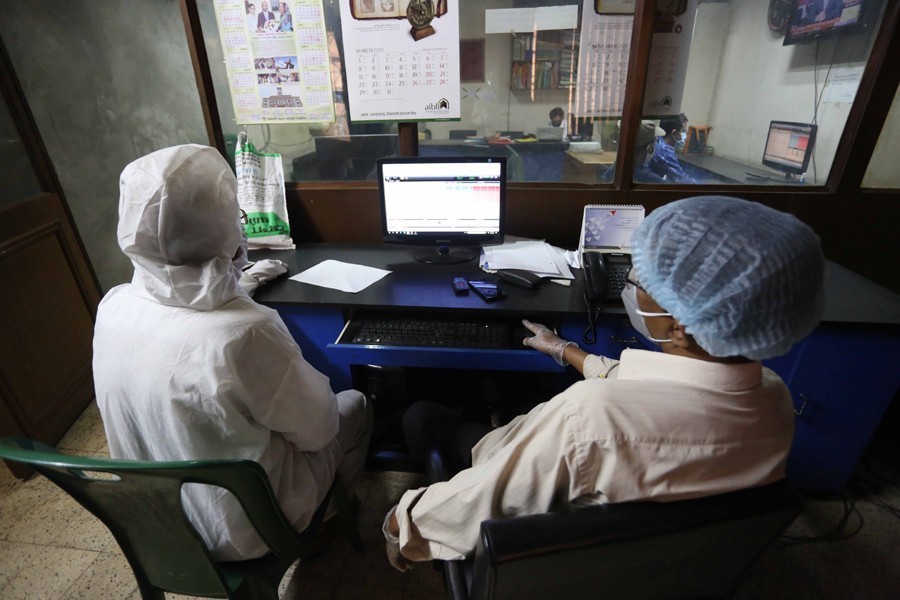Benchmark indices of both the bourses witnessed moderate correction against the sharp losses observed by some of the indices of south Asian stock exchanges amid Covid-19 pandemic.
The market insiders said the indices of the country's stock exchanges escaped large fall during the period of January to March mainly riding on floor prices of the listed securities introduced to arrest the market fall.
At the end of December, 2019 the DSEX, benchmark index of Dhaka Stock Exchange (DSE), closed at 4,452.93 points.
Later, the DSEX came down to 4008.28 points with a loss of 10 per cent or 444.65 points on March 25.
At the end of March, 2020 the benchmark index of Chittagong Stock Exchange (CSE) stood at 11,328.12 points with a loss of 16 per cent or 2,177.58 points from the mark observed at the end of December, 2019.
The indices of other south Asian stock exchanges posted losses ranging from 6.0 per cent to 32 per cent for the period of December 29, 2019 to March 31, 2020, according to information of Chittagong Stock Exchange (DSE).
"The floor prices halted a lot to rein in the abnormal price fall," said the managing director of a leading merchant bank.
He, however, said many shares' prices, which earlier had declined presently have displayed an upward trend indicating a recovery stance.
The Bangladesh Securities and Exchange Commission (BSEC) issued a directive on March 19 setting floor prices of the listed securities.
As per the BSEC directive, opening price of any listed security shall be set at the average of the closing price of immediate preceding five trading days of March 19, and this average price calculated for each security shall be considered as floor price and the lowest limit of the circuit breaker.
Of the south Asian Stock Exchanges, the index of Philippine Stock Exchange posted the highest loss during the period of January to March, 2020.
On the other hand, Shenzen100, the index of Shenzhen Stock Exchange, posted the lowest loss during the same period.
Composite Index, the index of Shanghai Stock Exchange also witness the minimum loss compared to the losses posted by the indices of other south Asian stock exchanges.
At the end of March, 2020, the PSEi, the index of the Philippine Stock Exchange, declined 32 per cent or 2,494.03 points to close at 5,321.23 points from the points observed at the end of December, 2019.
NSE India, the index of National Stock Exchange of India, posted the second highest loss of 30 per cent or 3,697.55 points during the pandemic.
At the end of March, 2020 the NSE India came down to 8558.30 points from 12,255.85 points observed at the end of December, 2019.
Of other stock exchanges, the index of Pakistan Stock Exchange declined 29 per cent or 11,656 points during the period of December, 2019 to March, 2020.
The indices of Indonesia Stock Exchange, Thailand Stock Exchange, Colombo Stock Exchange, Japan Stock Exchange and Taiwan Stock Exchange posted losses ranging from 19 per cent to 29 per cent during the Covid-19 pandemics for a period of January.
The index of Bursa Malaysia declined 12 per cent at the end of March, 2020 from the points observed at the end of December, 2019.
Shenzen100, the index of Shenzhen Stock Exchange the lowest loss of 6.0 per cent or 379.20 points to close at 5,629.65 points at the end of March, 2020 compared to the mark observed at the end of December, 2019.
Composite index, an index of Shanghai Stock declined 8.0 per cent 226.23 points to close at 2,750.30 points during the same period.
After the introduction of floor prices, both the Dhaka and Chittagong Stock Exchange remained closed for 66 days since March 26 to May 30.
The trading at the bourses reopened on May 31 last and later trading on both the bourses remained dull as the majority number of sale orders placed above the floor prices.
As a result, turnover in many sessions declined as the floor prices kept the buyers aloof.
On Sunday, the DSEX closed at 4050.64 points which was 4060.44 points on March 31.
Later, experts and market operators made the demand of withdrawing the floor prices.
The securities regulator said the floor price mechanism will be lifted following a better situation.


